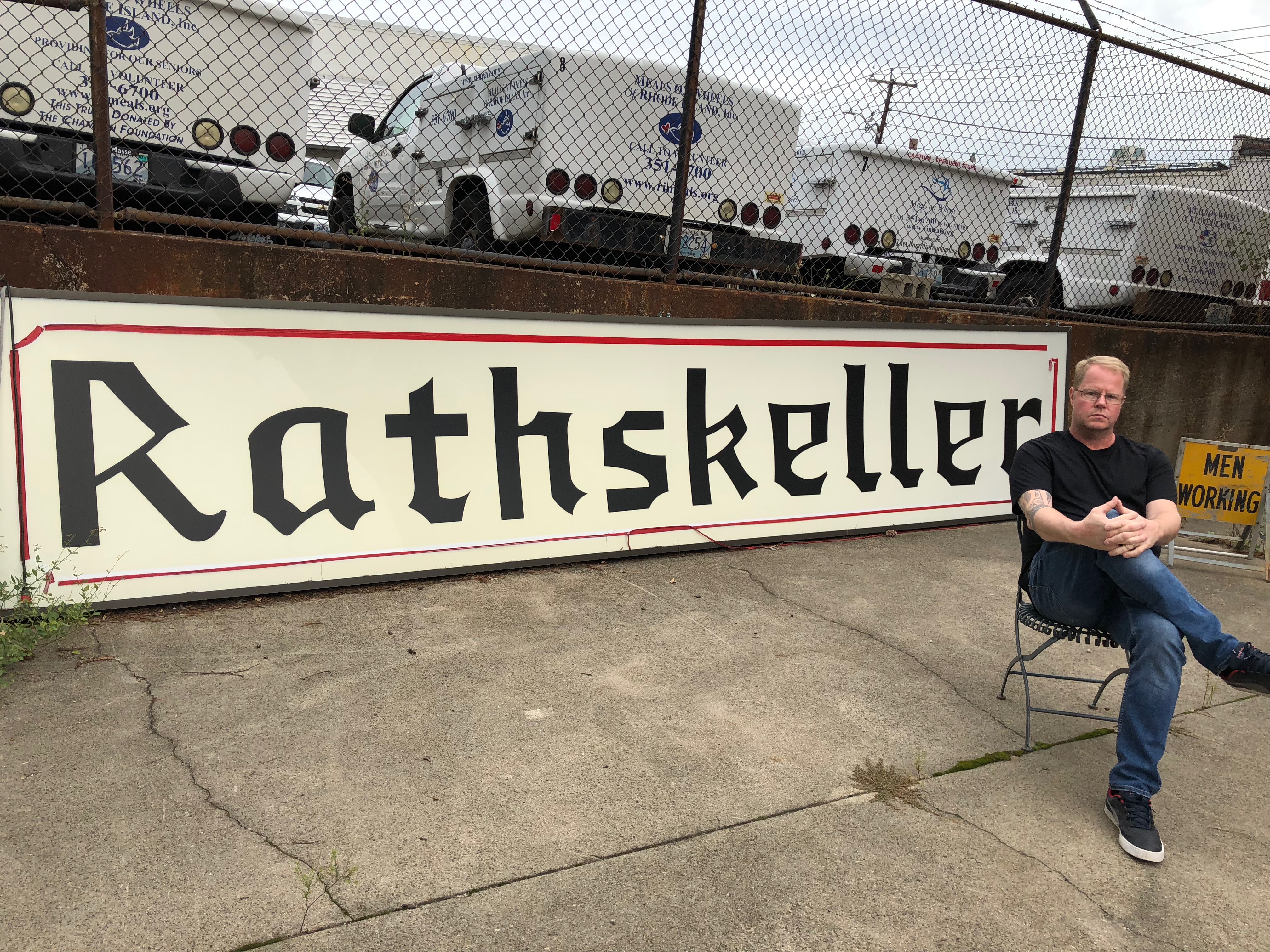Brian Coleman Rat Sign. Photo by Margot Edwards
It may be tough to believe for those who weren’t there, but the Celtics weren’t the only thing happenin’ in the city of Boston throughout the ‘60s, ‘70s, and ‘80s – and local historian Brian Coleman is here to remind us of that.
Coming in the form of his fourth book, “Buy Me, Boston,” Coleman has curated a 294-page time capsule of sorts that looks back, through archived ads and fliers, on the vibrant arts scene, the eclectic approaches to local advertising, and everything in between that made Boston a cultural hotspot for decades. It’s a little different than what Coleman is used to publishing, as he admits his first three works were almost excessively text-heavy, but with his newest effort, he’s paying a visit to the other end of the spectrum.
“I’ve always wanted to do some sort of love letter to Boston, and it took me awhile to figure out what the best approach to that would be,” Coleman told Spare Change News. “Personally, I’ve also always been fascinated by the way people use advertising, and maybe a little more than others, I have always paid a little bit more attention to ads when they come on TV.”
It was that enthrallment with advertisements, and the notion that ads are just “throw-away garbage” for many people, that challenged Coleman to construct this lookback to a cultural heyday using only ads. Not only do the ads aim to tug at the heartstrings of locals who long for the good ol’ days of places like Aku Aku, Hilltop Steakhouse and the Rathskeller, but Coleman also wanted to remind readers of places that are still standing after all these years, like Kowloon, Legal Seafood, and Paradise Rock Club. In the process of doing just that, Coleman paints a picture, through the mix of “plain” and more over-the-top layouts, just how the city existed together back in the day.
“There’s a good mix of [places gone, and places still here], and I hope it’s equal parts thinking about the good times at the places that are no longer here, but also realizing that a lot of these mom and pop shops have weathered a lot of storms to stay standing over the years,” said Coleman. “There are a lot of defunct places remembered in the book, but there are also a lot of places mentioned that are still chugging, and I think it’s important that those places are celebrated.”
The book works to remind readers of how vibrant the city of Boston was, and does so with heartwarming nostalgia. And while he consciously avoided covering it in the book, the longtime Massachusetts resident points out, unfortunately, it wasn’t always a very vibrant city together. In many ways, the city has a shameful history with race relations, where events like the busing crisis cast a dark cloud over the cultural significance of the city for many years.
“[Boston] was a very segregated city, and it’s still a very segregated city in a lot of ways, but the one thing I tried to do was present a bird’s eye view, instead of basing it off of my perspective,” said Coleman. “There was all this great stuff happening in Roxbury in Dorchester, and there was all this great stuff happening in Boston and Cambridge, but sadly, something that I don’t point out in the book because it would make a whole other book, is that those populations did not mix well at all.”
But for all the animosity that simmered in plain sight for decades in the city and its surrounding neighborhoods, Coleman acknowledges a very important moment in the midst of the city’s tumultuous co-existence that showed harmony was, in fact, achievable – the Amandla Festival at Harvard Stadium in the summer of 1979, which featured Bob Marley and the Wailers, Patti LaBelle and Dick Gregory, among others.
“[The Amandla concert] is the perfect example of how I wish Boston was every minute of every day, because Harvard Stadium was packed, and it was this very kumbaya moment where people came together to help those struggling with apartheid in South Africa,” said Coleman. “While I don’t want to sweep things like the busing crisis under the rug by any means, if given the choice, I would much rather remind people of things like the Amandla concert.”
Brian Coleman loves this city, and while not in the sense of being a curmudgeon longing for the good old days, he wanted to keep the spirit of a long gone Boston alive – and he isn’t done yet.
“When I started putting this together, it was an experiment. And I really feel like there was a validation of the concept I was aiming for. The main takeaway for me, is that the experiment was success, and that’s great because I fully plan on continuing to do this again, not only in print, but also through video content and events throughout the year. I couldn’t do it by myself, either, because I lean on incredible people like David Bieber and Kay Bourne for their archives. In the same way that it’s meant for the community, I also lean on the community to give me materials.”

Leave a Reply
You must be logged in to post a comment.